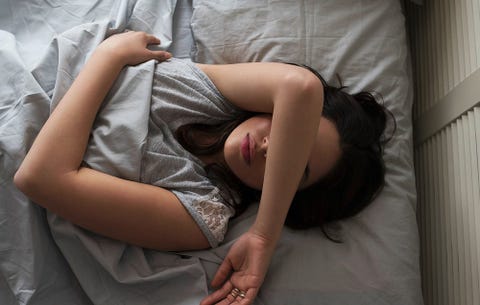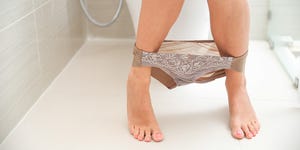
Picture it: You climb into your cozy bed, snuggle up under the comforter, and drift off to sleep…only to wake up a few hours later totally drenched in sweat.
Miserable? Yes. Also kind of scary? Yes to that, too.
Most of the time, your night sweats could be caused by something totally harmless—like the temperature of your bedroom or the fabric of your pajamas. But sometimes, your sweaty nights might be a sign of an underlying condition you need to get checked out ASAP, says Neomi Shah, M.D., associate professor, pulmonary and sleep medicine, at the Icahn School of Medicine at Mount Sinai.
A general rule? If your night sweats persists for more than two or three months, get yourself checked out, says Shah—but instead of jumping to the worst-case scenario, take a peek at what commonly causes night sweats in women, and what you can do about it.
1. Your room is just too damn hot.
What’s the temperature of your bedroom right now? If it’s anything other than 60 to 70 degrees Farenheit, it’s probably too hot, says W. Christopher Winter, M.D., sleep specialist and author of The Sleep Solution: Why Your Sleep Is Broken and How To Fix It.
Less-breathable fabrics (like your flannel pajamas) can also contribute to your sweaty sleep woes, which makes breathable cotton a better option for both your PJs and sheets.
Feeling hot can also impede your ability to actually fall asleep—in the process of drifting off, your body temperature should drop one to two degrees below normal, and it can’t do that in a warm room.
2. You have an excessive sweating disorder.
Yes, that’s a thing—it’s called hyperhidrosis—and, according to the American Academy of Dermatology (AAD), it essentially happens when a person sweats more than necessary (yes, even while they’re sleeping).

One big difference between hyperhidrosis and run-of-the-mill sweating: Hyperhidrosis only affects specific body parts, per the AAD, specifically your palms, feet, underarms, and head. Keep in mind though, this is excessive sweating—the AAD says hyperhidrosis can interfere with daily activities (like opening doorknobs or using computers) in those who have it.
If you think you have hyperhidrosis, talk to your dermatologist—they can prescribe specific deodorants or other methods of treatment like Botox injections to block sweat glands, per the AAD.
3. You’re actually running from something in your nightmares.
This is probably the simplest explanation for those sweats: “If the sweating is chronic…sometimes it can be that the patient is totally healthy and is actually running in a dream, or frightful in a dream,” says Harry Banshick, M.D. “The sweat is the consequence of acting out the dream.”
Shah agrees, saying that anything that causes what’s called a sympathetic surge (also known as a fight-or-flight response) can lead to sweating. If you’re having ongoing, persistent nightmares, see your doctor to find out what might be causing it (stress is a big culprit).
4. Your body’s going through hormonal changes.
One of the most common causes of night sweats for women is fluctuating estrogen levels, Nandi says. “Menopause is associated with hot flashes, so it’s not uncommon for patients to report sweating even during their sleep,” Shah says.

If you’re pregnant or on your period, those hormone fluctuations could lead to night sweats, too. However, menopause tends to cause to the most persistent sweats, and if it’s truly affecting your quality of life or sleep, Shah says it’s worth talking to your doctor about. “Sweating from menopause is unpredictable, but if you talk to your ob-gyn about hormone replacement therapy, it could help keep your temperatures under control.”
5. You’re taking antidepressants.
Patients taking antidepressants can definitely see an uptick in night sweats, Shah says, as certain classes of medications can cause an adrenergic reaction, which has to do with your adrenaline levels and leads to sweating. If you’re taking venlafaxine (or the brand-name Effexor) or bupropion (or its brand-named Wellbutrin, Zyban, or Aplenzin), you may experience more night sweats, Shah says.
But there’s good news if you don’t want to switch your antidepressant, as Shah says there are drugs docs can prescribe to calm down the adrenergic output, which won’t counteract your mental-health needs.
6. Your body’s fighting off an infection.
“Infections in general are related with changes in temperature because they come with fevers that will break, and that is obviously a common reason to sweat,” Shah says.

One rare infection that’s commonly associated with night sweats: tuberculosis, which can infect any part of your body but is well-known for its effect on your lungs. People with an immunocompromised condition, like HIV, can develop tuberculosis more easily, Shah says. You might start sweating in your sleep before you even start coughing or realize something is wrong, Shah says, so see a doc stat if the symptoms persist.
7. You have undiagnosed lymphoma.
Lymphoma—a cancer of part of the immune system, according to the U.S. National Library of Medicine (NLM)—can cause multiple symptoms like fever, changes in weight loss, and, yes, night sweats, says Shah. Essentially, your body recognizes lymphoma as something it needs to fight off, and raises its temperature to try to do so, she adds.
While these “soaking sweats,” per the NLM, happen at night, heavy sweating might occur during the day for this, too, so get to your M.D. if you’re experiencing any other symptoms and they can test you for the condition, says Shah.
Source: Read Full Article